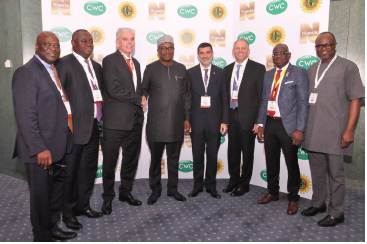Industry Collaboration Needed to Navigate Through The Global Pandemic, Experts says
By Ndubuisi Micheal Obineme
DMG Events hosted its first Energy Webinar Series titled: “Strategies to Navigate the Oil & Gas Business through the Global Pandemic” with a focus on the future economic forecast in Nigeria, and the impact of the COVID-19 in the oil and gas industry.
The speakers include; Ainojie Alex Irune, Chief Operating Officer, Oando Energy Resources, Oluwatoyin Aina, Group Head – Energy, Downstream & International Oil Trading, First Bank of Nigeria, Ade Adeola, Managing Director – Energy & Natural Resources, Standard Chartered Bank PLC, and Seyi Bella, Partner, Banwo and Ighodalo, as they opened discussion on
Strategies to Navigate the Oil & Gas Business Through the Global Pandemic.
The panel discussion was moderated by Bismarck Jemide Rewane, MD & CEO of Financial Derivatives Co Ltd.
In his presentation, Bismarck Jemide Rewane explained that in 2019 global
growth was projected at 2.9% but due to the COVID-19 Pandemic, it now stands at – 3%. While in Sub-Saharan Africa, the economic growth in 2019 stands at 2.1% but today it is projected at -1.6%.
According to his report, the sectors that will be affected most likely in Nigeria during this pandemic are; Aviation, Hospitality, Trading, Catering, Brewing, Real Estate, Entertainment, Transportation, Crude Petroleum, Health Insurance, etc. While other sectors that will benefit include; Telecoms, ICT, E-commerce, Electronic payment, Mining & Quarrying,
Distributions & Storage, Healthcare, Pharmaceuticals, Oil & Gas Upstream,
among others.”
Speaking about the impact of the current market condition in Nigeria’s oil and gas industry, Ainojie Alex Irune, Chief Operating Officer of Oando Energy Resources, said that oil producers have to look for an efficient way to minimize their budget and cost of production. And, the government will play a vital role more especially to assist local producers in terms of incentives and providing an enabling environment.
Irune said: “The recent OPEC, OPEC+ production cuts of about 10 million barrel is a historic one in the oil and gas industry. For us in Nigeria, it is about 22% of over 2 million barrels per day production.
“The Nigerian Government has been very aggressive to bring down the cost. And, it is the first time we are seeing it.
“But, the Petroleum Industry Fiscal Bill will be very useful this period as it speaks very much in a situation like this. I would urge the Federal Government to take a closer look at this for the passage of the Bill,” he added.
Ade Adeola, Managing Director, Energy & Natural Resources of Standard Chartered Bank, noted that the oil and gas industry is a huge catalyst due to the number of players operating in the industry. And, the COVID-19 has induced CAPEX Cut which resulted in key projects been delayed.
Countries like Cameroon, Nigeria, Ghana, and Senegal have put on hold some of their deepwater projects. While some are been reviewed, optimized and some of the projects will be canceled.
“We do not expect to see additional project been sanctioned. Capital will flow to where it gets is best value and investors require variables that they can manage and control.
“We have seen the efforts of the Federal Government of Nigeria regarding the PIGB as they are working on passing the Bill to address specific challenges and to move the industry forward. But, we need to rapidly implement the PIGB as it will help in situations like this.”
Speaking further, he advised producers to consider new cost consolidation strategies, adding that IOCs in Nigeria should see this global pandemic as an opportunity to collaborate on cost reduction.
He stressed that industry players need to work together on collaborative measures to provide advocacy to policymakers putting forward a clear part of how to reduce the overall cost budgets and how to optimize value in the industry more efficiently.
In his forecast for 2020 – 2021, he highlighted that there will be challenges in the industry due to the oil price plunge and the coronavirus pandemic.
According to him, there is going to be a lot of pain further down the line as all those projects that are been delayed create an imbalance in the market.
The industry will witness a demand shock due to the global pandemic.
“But, when that demand goes off, all the projects that have been delayed will be reviewed again for FIDs and the market will start rebalancing by 2021 to 2022. Oil prices may rise to $44 – $50 per barrel,” he said.
Oluwatoyin Aina, Group Head Energy, Downstream & International Oil Trading, First Bank of Nigeria, in her words, she explained: “Aside from reducing cost, indigenous producers should begin to do the valuation of the asset they want to buy and they have to be very conservative so that they don’t run into stunning waters.
She said the Financiers have a very important role to play by curtailing the pricing and bidding of assets to ensure they maintain their budget.
She advised the Government to set up a monetary board and anti-trust consumer protection agency that will monitor and ensure that bids aren’t overrated and value aren’t been removed from the economy.
She also said that diversification of alternative funding sources is
recommended as some producers have moved into that process.
During her speech on Force Majeure, Seyi Bella, Partner of Banwo and Ighodalo, said companies shouldn’t use the current market condition as an excuse to terminate contracts but rather the way forward is restructuring their business agreement.
That is to say, all parties involved should reevaluate their business plans instead of canceling contracts.
She continued: “There should be a stakeholder collaborative approach in trying to help oil and gas companies thrive in this global pandemic.
“Bank and borrowers need to work together to offer incentives. While CBN should be at the frontline in dealing with it,” she concluded.


